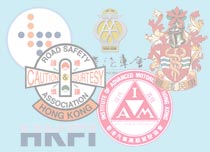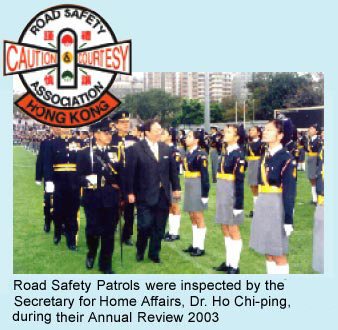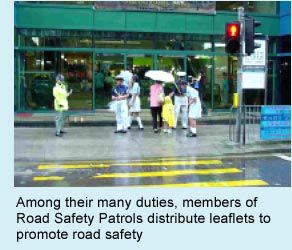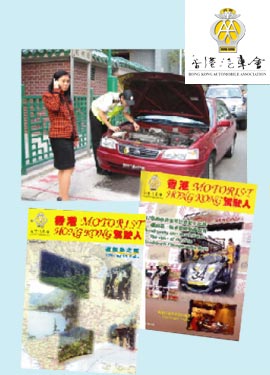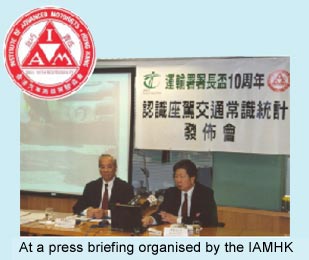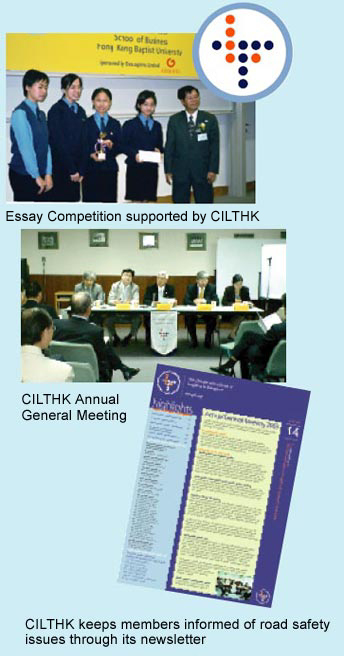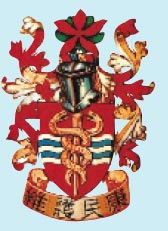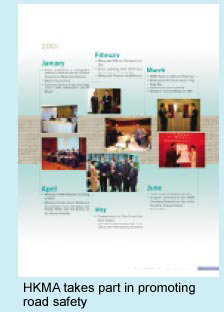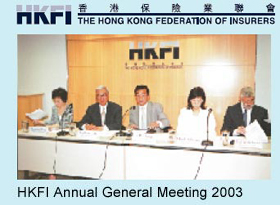|
Non-government Organisations
|
|||||
|
|||||
|
Each has a specific role to play; each is
a specialist in its field, and each is run by professionals, experts
and members knowledgeable in road safety. Their contribution in
the strategies and policies of the Council are immeasurable. By
and large, they are made up of volunteers; men, women and children
who believe in the community they serve and who share the common
objective of making Hong Kong a safer place to live.
|
|||||
| The Hong Kong Road Safety Association (RSA) | |||||
|
|||||
| The Road Safety Patrol was formed two years after the formation of the Road Safety Association. Volunteers serve as officers and it is headed by a Commissioner appointed by the Association's Executive Committee. | |||||
|
|||||
|
Over the years its pedestrian safety education
programme has evolved to encompass the entire community and now
more and more elderly people, the most vulnerable to pedestrian
accidents, join the youngsters in the Road Safety Patrol. Today
many elderly people can be seen at pedestrian crossings spreading
the message to other pedestrians to ensure the safety of people
crossing the road.
Members of the RSP have helped not only in promoting road safety in Hong Kong but also to serve the community. They are given the opportunity to broaden their horizon with chances to meet other youth road safety groups outside Hong Kong. A website (www.rsa.org.hk) has been developed for the exchange of and updating of road safety information. |
|||||
| Hong Kong Automobile Association (HKAA) | |||||
|
|||||
|
Vehicle maintenance is an essential component
of the Association's services with the vision that safe cars make
roads safe. Its depots are among those designated to carry out
road worthiness inspections for vehicle registration.
The HKAA is a member of the Alliance Internationale de Tourisme (AIT) and the Federation Internationale de l' Automobile (FIA), whose common concerns are focused on freedom of mobility, safer roads and cleaner cars. The Association's president attends their General Assembly each year to share views, knowledge, strategies and advanced technologies developed by member associations. The Association's mission is to help the Government and road users with ongoing endeavours to reduce traffic accidents. The promotion of a greater awareness about road safety, combined with sustained enforcement of laws by the Police, has undoubtedly contributed to the decreasing road traffic accidents toll in recent years. |
|||||
| The Institute of Advanced Motorists Hong Kong (IAMHK) | |||||
|
|||||
|
The Institute acts as a bridge between the
Government and the motoring public in the dissemination of road
safety messages and feedback from drivers.
|
|||||
|
The IAMHK takes part in most of the campaigns
launched by the Road Safety Council including the on-going 'Smart
Driving' campaign and the Road Safety Vision and Symbol Design
Competitions.
|
|||||
|
In 2003, the Institute continued to organise,
as it had done for the past 10 years, the Commissioner for Transport's
Safe Driving Competition and it assisted a number of major companies
and organisations with talks and demonstrations for their drivers.
|
|||||
| The Chartered Institute of Logistics and Transport in Hong Kong (CILTHK) | |||||
|
|||||
|
giving it the authority to handle all institute
matters independently. Its membership grew as its interdependence
with allied activities evolved in 2001 it underwent its current
name change to the Chartered Institute of Logistics and Transport.
|
|||||
|
The CILTHK
sets and maintains professional standards through qualified programmes
and codes of practice, as well as seminars, forums, conferences
and visits for its members. For some time it has participated
in transport and logistics-related public committees and advisory
bodies, offering a professional view on industry matters to the
Government.
Committed to road safety, the CILTHK participates in the Council's Road Safety Campaign Committee and Road Safety Research Committee and became an active member of the Road Safety Council in August 2001. Working hand in hand with the Road Safety Council, the Highways and Transport Departments, Customs and Excise, the Police and Immigration authorities, the Institute pays attention to the goods vehicle sector plying our highways with trade across the boundary points at Lok Ma Chau, Man Kam To and Sha Tau Kok with an objective to enhance road safety and facilitate the dissemination of road safety messages to the trade. |
|||||
|
|||||
|
|||||
|
With its motto — To Safeguard the Health
of the People — the Association actively disseminates to
the Council, its members and the public, medical knowledge gleaned
from its membership of the World Medical Association, the Confederation
of Medical Associations in Asia and Oceania and the Hong Kong
Pharmacy and Poisons Board.
|
|||||
| The Hong Kong Federation of Insurers (HKFI) | |||||
|
|||||
|
The Federation, established in 1988, has 150
members and is recognised as the representative body of the insurance
industry. It consists of two councils: the General Insurance Council
and the Life Insurance Council. Under the General Insurance Council
is the Accident Insurance Association which handles all matters
relating to motor insurance.
During 2003 the federation continued its education programmes to policyholders with the distribution of leaflets and road safety messages. |
|||||
